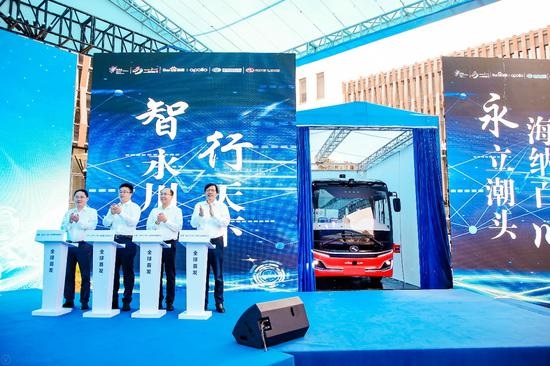Baidu Apollo debuts first L4 autonomous bus in Chongqing
Shanghai (Gasgoo)- On September 17, Robus, a medium-sized autonomous bus jointly developed by Baidu Apollo and domestic bus manufacturer King Long made its world's debut in Chongqing.
At the same time, Baidu obtained 10 license plates issued by Chongqing municipal government, which permit road tests for self-driving vehicles with passengers carried.

(Photo source: Baidu Apollo)
The 5.9-meter-long Robus is the third model coming from the joint efforts of Baidu and King Long. Boasting Level 4 autonomous driving technologies, Robus is equipped with four LiDARs, two millimeter-wave radars and seven monocular cameras, and can accommodate up to 19 passengers.
By virtue of the precise parking capability, the Robobus is able to accurately stop at stations, and can easily cope with the scenarios of bus stops and even more complex urban road conditions.
On the same day, a test base for autonomous driving was put into use in Chongqing after one-year construction.
Located at the downtown Yongchuan District, the test base contains more than 30 open road testing scenarios that are particular to Chongqing, the city distinguished for its mountainous terrain, including flyovers, tunnels and bridges, and allows 200 ICVs (intelligent-connected vehicles) to be tested simultaneously. With a 5G communications road network fully deployed, the test base is supported by the comprehensive collaborative works of vehicles, roads, cloud and HD map.
While the Robus being unveiled, Yongchuan District launched an autonomous bus route code-named YZ001 at the same time, the first-of-its-kind for Western China. Three Robobuses are set to be deployed on the route to ferry passengers among seven stops.
Gasgoo not only offers timely news and profound insight about China auto industry, but also help with business connection and expansion for suppliers and purchasers via multiple channels and methods. Buyer service:buyer-support@gasgoo.comSeller Service:seller-support@gasgoo.com







